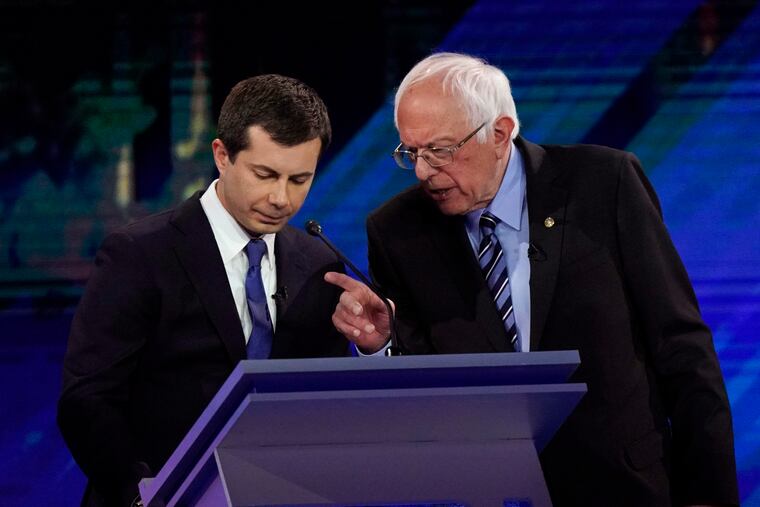Pete Buttigieg, Bernie Sanders campaigns request Iowa caucus recanvass
On Sunday, the state party released updated caucus results that gave Buttigieg a lead over Sanders of two state delegate equivalents out of 2,152 counted, or 0.09 percentage points.

WASHINGTON — Bernie Sanders’ and Pete Buttigieg’s presidential campaigns filed requests Monday for a partial recanvass of the results of Iowa’s Democratic caucuses.
The Sanders campaign cited "mathematical errors and inconsistencies" in more than two dozen locations that it says would change the results if amended. And the Iowa Democratic Party said the Buttigieg campaign requested the party check the results in 66 precincts.
On Sunday, the state party released updated caucus results that gave the former South Bend, Indiana, mayor a lead over Sanders of two state delegate equivalents out of 2,152 counted, or 0.09 percentage points.
Iowa awards 41 national delegates in its caucuses. As it stands, Buttigieg has 13 and Sanders has 12. Trailing behind are Elizabeth Warren with eight, Joe Biden with six and Amy Klobuchar with one.
The 41st and final delegate from Iowa will go to the overall winner. While the state party said Sunday that it belongs to Buttigieg, the caucus won't formally come to an end until the campaigns' requested recanvass — and any potential recount to follow — is complete.
The Sanders campaign has outlined 25 precincts and three satellite caucuses where it believes correcting faulty math could swing the delegate allocation in Sanders' favor and deliver him, not Buttigieg, that final delegate.
The Associated Press reviewed updated results of the Iowa caucuses provided Sunday evening and decided that it remains unable to declare a winner based on the available information. The results, the AP says, may not be fully accurate and are still subject to potential revision.
The caucuses were roiled by significant issues in collecting and reporting data from individual precincts on caucus night. There were also errors in the complicated mathematical equations used to calculate the results in individual caucus sites that became evident as the party began to release caucus data throughout the week.
A recanvass is not a recount, but a check of the vote count against paper records to ensure the counts were reported accurately. Iowa Democratic Party volunteers have already undertaken this process with most of the precincts, and the party has told Iowa Democratic activists it will not correct any faulty math recorded by volunteers in each precinct because changing the paper documentation would amount to criminally tampering with a legal document.
A recount would require the party to check the results reported by volunteers in each individual caucus against cards used by each caucusgoer to record his or her picks.
In a statement, Sanders senior adviser Jeff Weaver said the campaign does not expect the recanvass to change the results of the caucuses, but he also suggested the campaign may ask for a full recount in the future.
“Once the recanvass and a subsequent recount are completed in these precincts, we feel confident we will be awarded the extra national delegate our volunteers and grassroots donors earned,” he said.